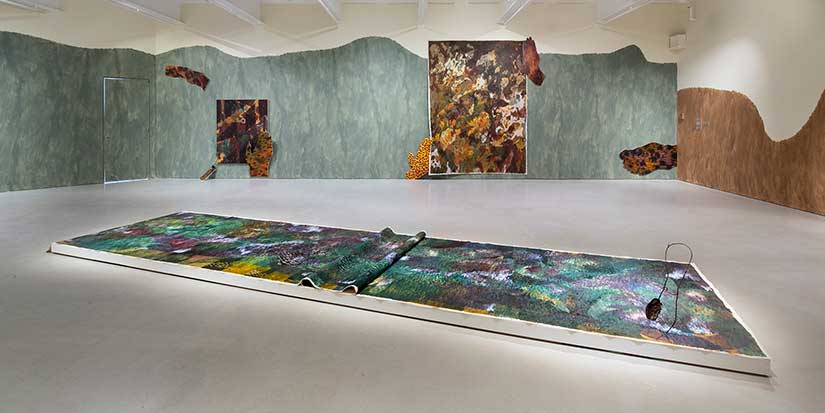Arts & Culture
Art gallery exhibition invites viewer contemplation

By Hannah Scott
Published 2:07 PST, Thu November 10, 2022
Last Updated: 3:59 PST, Thu November 24, 2022
—
The upcoming Richmond Art Gallery exhibition The trees weep, the mountain still, the bodies rust features paintings by Ontario-based artist Derek Liddington.
Liddington started making art as an undergraduate student studying performance art at the Nova Scotia College of Art and Design, and has been creating for over 20 years. He later completed a Master’s degree at Western University.
He finds inspiration in the work of other artists, and this exhibition was sparked in part by the works of Paul Cézanne and the abstraction movement.
“Now, painting is a real place of storytelling, thinking about personal narratives and lived experience—I think a lot of that is coming from painting right now in art, so I just look to other works,” says Liddington.
During the pandemic, Liddington fortunately was able to continue creating in his home studio, and has spent the last three years working on this exhibition.
“The world around us is really shifting, the things that artists naturally push back against—power structures, structures of capitalism, class, race—these are things that artists historically have always been pushing back on, and it bubbled to a point that everyone was talking about it,” he says. “For some it became slightly overwhelming, and made it hard for them to work. For me, I gained a bit of a source. I think the work reflects on some of the thinking and reflection I had during that time.”
Liddington hopes the exhibition will draw people in and invite them to contemplate the surfaces and the imagery; he aims to create a feeling of unease with a dose of humour. But it’s not his intent to have viewers think a certain way.
“Maybe it’s looking at something and it not being what it might seem—the paintings in this exhibition are meant to ponder what you’re looking at,” says Liddington. “Is it a foot, or is it this molecular structure of a foot, or is it moss? Is it something that’s working with illusion, or something that’s not working with illusion?”
While the initial show was built around the Musée d’art de Joliette in Quebec, where it was first exhibited, Liddington is excited to have it shown in B.C. because the west coast landscape contributed to his inspiration.
“The imagery that started this show came from a residency when I was working in Vancouver,” he says. “That idea of scale and landscape that the show discusses partially comes from that; it’s nice geographically to bring it back to the space.”
Being able to revisit his previously exhibited work allowed Liddington to look at it without emotion, make some changes, and create three new paintings for this exhibition. He approaches art with the belief that its rules are meant to be broken and its systems are meant to be challenged.
“That’s a fair discrepancy between art and design; design can’t be challenging in the same way,” he says. “There’s always a relationship to function, product, and capital that design has to function in, (although) some designers are amazing at pushing back on that. But art can always push on that, it doesn’t need to abide by that—I love that. There’s a rigour to it, you have to be smart about it but you can always question, and there’s no other field that I know where you can do that.”
The recent passing of established Vancouver artist Rodney Graham caused Liddington to reflect. He wrote his Master’s thesis on Graham, and at the time was creating works inspired by those of Graham. When Liddington met Graham, he asked about his music practice.
“I listened to the album Rock Is Hard obsessively,” says Liddington. “I asked him why he made it, he said it was hard, it was not easy. (That) stuck with me a little bit. Since then I have switched quite frequently what I do—I moved from drawing to painting, video, performance, so maybe that was a piece of advice. (Graham) never seemed to make a project that was easy, there always seemed to be a bit of strain in there. He’s brilliant, so it always seemed flawless, but when you look at it the brilliance is that he was learning.”
Liddington’s upcoming exhibition is curated by Anne-Marie St-Jean Aubre, the curator of contemporary art of the Musée d’art de Joliette since 2017.
“It is always interesting to be close to artists while they are developing new bodies of work,” says Aubre. “This project went through several stages because it was postponed due to the pandemic, a situation Liddington took advantage of by continuing to push his creative process until the very moment when we installed the work in our gallery space.”
The different display spaces add a new layer to Liddington’s work, says Aubre. While the initial gallery at Joliette allowed the viewer to be situated inside the landscape, the Richmond gallery space locates the viewer outside the scene looking at the landscape.
“These different points of view change the experience of people visiting the exhibition and speak to the evolution of the project since it was first shown in Joliette,” says Aubre.
The trees weep, the mountain still, the bodies rust by Derek Liddington is on at Richmond Art Gallery from Nov. 19 through Jan. 15, 2023. For more information, visit richmondartgallery.org/treesweep






























